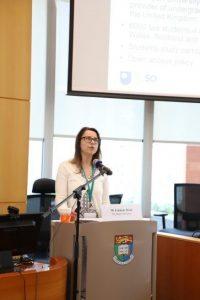Another half century: Hong Kong Law School at 50

Francine Ryan reports on her experience of being invited to address an international legal education conference celebrating 50 years of Hong Kong Law School
The Open University isn’t alone in marking its 50 year anniversary. Hong Kong Law School has reached the same milestone and, to celebrate, they organised an international conference exploring cutting edge approaches to legal education from around the world. The conference was titled Experiential Learning and Innovations in Legal Education and provided a platform for academics working to shape the future of legal education, to share ideas and develop new projects.
The Open Justice Centre is gaining an international reputation for using technology to provide innovative ways of embedding experiential learning into the legal curriculum. In recognition of this, I was invited to take part in the conference and present my empirical research findings on the impact of our award-winning online advice clinic.
The conference focused on the importance of encouraging students to ‘learn by doing’ through embedding learning within real-world contexts. It showcased the growing number of innovative projects being developed that are responding to the disruption brought about by rapid technological change. The conference discussed how law schools are facilitating the development of practical legal activities to help students gain knowledge of the law, but also understand how the law works in practice and in doing so encouraging students to help real people with real legal problems.
The shift from the physical space to the virtual space is impacting on the delivery of legal services. In my presentation, I shared how The Open University is pioneering the use of technology through the development of the Open Justice ‘virtual’ clinic. The advancement of technology is going to require workers to have new skills and capabilities to respond to new models of working. The Institute for the Future argues all future workers will require technological competence and the ability to work as part of a virtual team. The clinic offers students the opportunity to become familiar with using technology and learn how to collaborate online. Working in the clinic helps students develop the knowledge and skills required in a digital age.
But the clinic goes beyond helping our students develop the skills required for modern legal practice, it serves to build a bridge between law students and their communities to support legal empowerment, by helping clients to know, and use the law to resolve their problems. In the clinic, students have the opportunity to engage with complex legal problems and access to justice issues. The clinic serves a ‘virtual’ community empowering anyone with an internet connection to access the clinic. The clinic uses technology as a transformative tool to reach those clients who are unable to access to legal advice because they cannot attend face to face legal clinics.
The conference showcased how universities across the world are engaging in developing practical pro bono activities to enhance access to justice. Through these programs they are inculcating a commitment to the professional value of providing pro bono services. The range of examples included collaborations between charities and the free advice sector to develop online tools to empower communities whose voices are denied and marginalised. Technology has the power to democratise legal information, knowledge and advice and has the potential to contribute to the solution to the crisis in access to justice.
The conference was organised as part of the HKU Law School’s 50th birthday celebration. As well as delegates attending in person the conference was also live streamed to Sun Yat-sen University in China, demonstrating the power of technology to bring together communities across the world. The opportunity to share and discuss how law schools can continue to innovate to encourage students to learn by doing but also to respond to the growing issue of unmet legal need was invaluable. I have learned so much through attending the conference- I have brought back some new ideas that can shape the further development of the Open Justice Centre.
